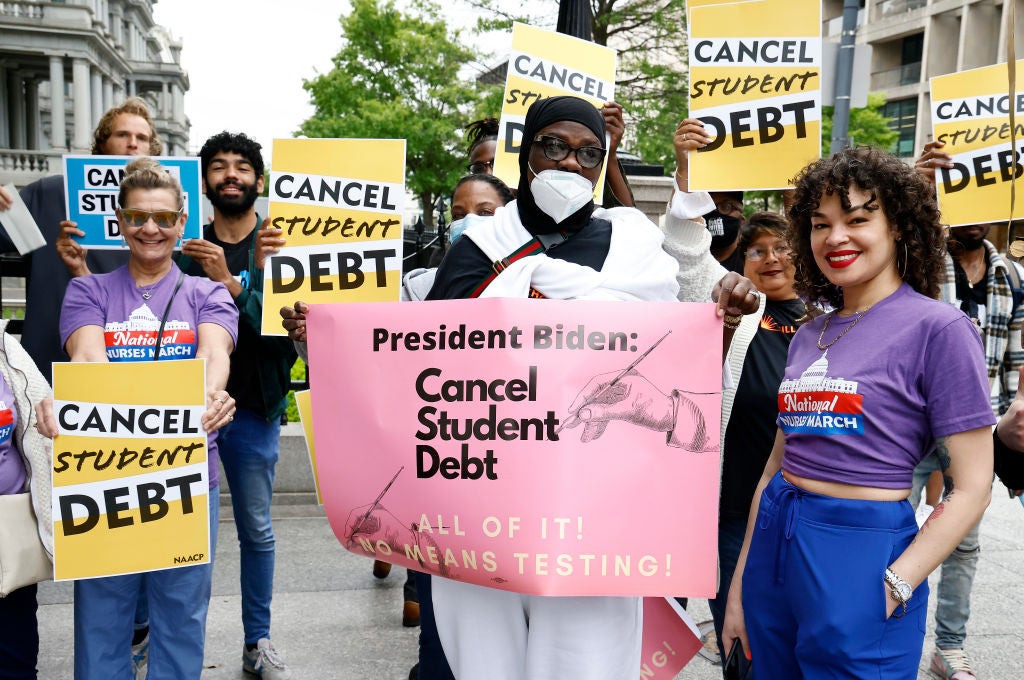
The Debt Collective launched a new campaign today: “Fifty Over Fifty.” The group’s latest crusade is “a coordinated student debt strike by older Americans to pressure President Biden to broadly cancel student debt,” according to a press statement shared with ESSENCE.
The campaign is strategically timed after their recent debt strike victory against ITT Tech, which resulted in the Department of Education providing 200,000 plus borrowers with almost $4 billion in relief.
According to Investopedia, the majority of student debt is held by adults over the age of 35. While borrowers under 34 held over $500 billion, their counterparts aged 35-49 and 50-61 owe balances of $622 billion and $281 billion of debt, respectively.
The New Yorker recently wrote about this oft overlooked issue, writing:
“Americans aged sixty-two and older are the fastest-growing demographic of student borrowers. Of the forty-five million Americans who hold student debt, one in five are over fifty years old. Between 2004 and 2018, student loan balances for borrowers over fifty increased by five hundred and twelve per cent. Perhaps because policymakers have considered student debt as the burden of upwardly mobile young people, inaction has seemed a reasonable response, as if time itself will solve the problem. But, in an era of declining wages and rising debt, Americans are not aging out of their student loans—they are aging into them.”
Founded by Astra Taylor in 2014, the Debt Collective became the first of its kind, “a union for debtors” fighting for debt cancellation, publicly funded college, and universal housing and healthcare. Over the past few years, calls for cancellation of student debt have become a rallying cry. Today, these calls have turned into action with this fifty-plus year old group of 50 student debtors. They have banded together, threatening to embark on a student debt strike if President Biden does not uphold his word with regard to cancelling at least some student debt for all borrowers, as upcoming payments on student loans are expected to resume in September.






Together, these seniors have joined up publicly—an immense act of courage—to explain that student debt is not just a problem for our nation’s youth. As Dawn Mills, a Black Fifty Over Fifty member from New York said, “I’m going on strike because I simply cannot pay off my student loans…I have been paying for over 20 years and the interest just keeps adding up and the amount has ballooned from $50K to over $100K. I tried several times to get relief by working in non-profit organizations to get the public service cancellations but was unsuccessful. I feel that I am in a trap with no escape. I can’t spend my life worrying about this insurmountable debt, so I simply am not going to pay it. I’m tired.”
Indeed, student loans are almost parasitic in nature—they can remain with someone until death, and even impact what should protect those who reach a certain age: if one defaults on their student loans, the Department of Education can garnish Social Security.
As a real-life example, in the 1980s, Olivia Faison studied at Queens College, graduating with approximately $9,000 in debt. Despite working for several decades, she was unable to receive better-paying jobs for which she was qualified due to transcript ransom, where she could not receive her transcripts as she had not paid off the money she owed for her degree. Furthermore, after finally reaching retirement age, Faison was horrified to learn that her Social Security payments were being hijacked because of her outstanding student loan debt balance. Faison has been indignant and outspoken, stating “if the big banks and corporations want to have the same rights as the individual, then don’t I, as a real individual, deserve to have the same rights that they do?”







